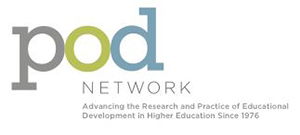FSSE researchers Allison BrckaLorenz (NSSE Research Analyst and FSSE Project Manager) and Bridget Yuhas (FSSE and NSSE Institute Project Associate), along with Rob Stupnisky (Associate Professor at the University of North Dakota), have been awarded the 2017 Robert J. Menges Award for Outstanding Research in Educational Development for their study entitled Why Do We Teach? Examining Faculty Teaching Experiences and Motivation.
The Professional and Organizational Development Network in Higher Education (POD) gives this award each year at their annual conference. This year's award committee commended the Why Do We Teach? proposal for its rigorous research and its potential to impact the field. The Robert J. Menges Award was established and first awarded at the 2000 POD Network Conference in Vancouver. The award was established in recognition of Robert Menges, an honored scholar and consummate mentor, who challenged, guided, and was deeply involved and beloved in our profession. It was in his nature to share what he knew and to help others find their own wisdom. This award thus recognizes original research - quantitative or qualitative - that leads to systematic investigation and evidence-based conclusions that can enrich our understanding.
As Why Do We Teach demonstrates, understanding motivations for teaching can provide a powerful window into what encourages faculty to do the work of instruction. One approach to doing so is by using self-determination theory, a widely-studied framework for human motivation (Ryan & Deci, 2017). Conceptually, self-determination theory describes several basic needs that can lead faculty to become optimally motivated to teach (Deci, Kasser, & Ryan, 1996): autonomy, competency, and relatedness. The aim of this study was to examine the relationship between these basic needs and faculty motivation to teach. This study additionally explored how these needs are met for diverse types of faculty. Deeper understanding of where faculty needs for teaching can be satisfied, as well as the relationship between those needs and motivation for instruction, can help institutions improve teaching and learning through fostering optimal motivation among faculty. The study was guided by the following research questions:
- How do the basic needs of autonomy, competency, and relatedness relate to faculty motivation to teach?
- How do these needs vary by faculty characteristics?
Allison, Rob, and Bridget found that faculty with a high degree of needs met for autonomy, competency, and relatedness had higher levels of intrinsic and identified motivation. Faculty with low degree of basic needs met had notably lower positive motivations for teaching. They additionally found that differences by field and various faculty characteristics may lead to situations that are more or less conducive to meeting teaching needs.
You can find more details about this study at the 2017 POD Network Conference in Montréal this October!
Deci, E. L., Kasser, T., & Ryan, R. M. (1997). Self-determined teaching: Opportunities and obstacles. In J. L. Bess (Ed.), Teaching well and liking it: Motivating faculty to teach effectively (pp. 57-71). Baltimore, MD: The Johns Hopkins University Press.
Ryan, R. M., & Deci, E. L. (2017). Self-determination theory: Basic psychological needs in motivation, development, and wellness. Guilford Publications.


